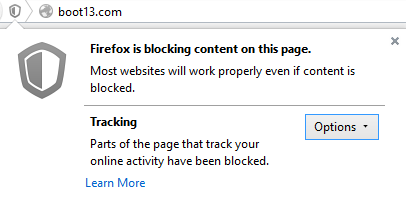By now you’re no doubt familiar with the warnings displayed by web browsers when you navigate to sites that use out of date or incomplete security. Typically, a browser will allow you to continue to the site in question, regardless of the security issue. While it can be argued that allowing the user to ignore security warnings is a bad idea, in many cases this is the only way for users to access some sites.
The classic example of this is when a business creates a self-signed SSL certificate for a web resource that is only accessible internally. Typically this is done when non-secure access to the resource is simply not supported. Creating a self-signed certificate gets around this limitation and costs nothing. Users accessing the resource will see a warning about the self-signed certificate, but can tell their browser to proceed anyway, knowing that there’s no actual danger.
Unfortunately, Mozilla seems to have eliminated the ability for users to bypass these warnings. I recently encountered this when using the current version of Firefox (39.0) to access a router on a local network. I received a cryptic warning:
SSL received a weak ephemeral Diffie-Hellman key in Server Key Exchange handshake message. (Error code: ssl_error_weak_server_ephemeral_dh_key)
In earlier versions of Firefox, I would then be allowed to continue regardless of the security issue. But that’s no longer the case. To access the router, I switched to Google Chrome, which showed the same warning, but allowed me to proceed.
I understand that Mozilla is trying to tighten security, and limit the ways in which uninformed users expose themselves to security risks, but I believe that this is going too far. It’s yet another example of how Mozilla is pushing users away from Firefox, to other web browsers.
Update 2015Jul09: I’m seeing workarounds for this problem, but they typically involve ignoring the security check completely. I only want to be able to bypass the check for specific sites.
Update 2015Aug07: Only certain types of SSL keys are being handled this way in Firefox now. Specifically, Diffie-Hellman keys that are 1024 bits long or shorter. Other self-signed keys still allow for exceptions to be added.
Update 2015Oct16: Chrome also no longer allows access to sites, services, or devices using Diffie-Hellman keys.
 boot13
boot13